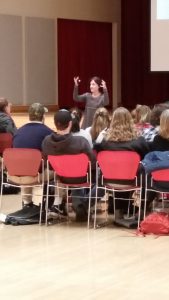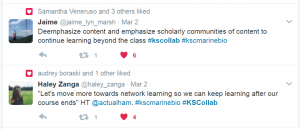Our spring break is just around the corner, and as we reach the middle of the semester I am thinking about how things have been going so far with our efforts to bring awareness to the value of Open Education at Keene State College. Jenny Darrow (@gobman) and I have spent many hours this semester immersed in planning and in wonderful conversations about what we can do on our campus. We’ve worked hard identifying and trying to motivate faculty who would be early adopters, excited to rise to the challenge of doing something new. Our faculty Open Pedagogy Learning Community has been humming along with great discussions emerging from that group. We have also put energy into numerous conversations and emails with administrators. (The admin reaction sometimes feels like high enthusiasm and sometimes feels like ‘pat-on-the-head’ support. Perhaps they just haven’t taken us seriously enough to be hostile yet says my cynical self!) But the way our work has been developing this semester has shown us that the students might just be the drivers of this Open Ed bus, the real ambassadors. A New England snowstorm ‘flipped’ the order of our first few guest speakers, and shifted my thinking about what we were doing.
If one of the important tenets of Open Pedagogy is that it is student-driven, then why shouldn’t an Open Education movement itself be student-driven?

The first speakers in our open education speaker series were students: Andrew Rikard, from Davidson College, and Erika Bullock, from Georgetown University. Their visit started with a conversation with our OPLC faculty, and I have to say that the dialogue that emerged, really blew my mind. Our faculty were riveted as the students talked about what it meant to them to take ownership of their learning. (This phrase- ‘students take ownership of their learning’ -really sunk in so much more deeply for me even though I had heard it and thought about it many, many times before).
Erika and Andrew spoke earnestly to professors of their fears about questioning faculty authority, an authority for which they have great respect, and they very much did not want to appear disrespectful or challenging. But they hoped that faculty would “respect the authority of students in their own experiences”. Faculty looked students in the eyes and spoke earnestly about their fear of being perceived as ‘not doing their job’. Students told of feeling uncomfortable with a professor when they ‘don’t know what you want’. We all wondered, how do we make it feel like ownership, not a burden? Erika and Andrew went even further to suggest that students themselves could decide whether Open is really the best path to learning for them. “What is my vision for myself?” “Do I enjoy being a collaborator and sharing?” Faculty pondered “How do we (if we can) increase student intrinsic motivation?”
Erika and Andrew suggested that faculty should be very transparent with students about what they are doing in order to convey a sense of ‘we are all in this together’. When Erika told us about a faculty member that shared her life story in the first class that ended with “…and this is why I am here, why I am teaching this”, it was extraordinarily moving for her. At one point Andrew said, “I got to watch somebody who I thought knew everything, learn.” And Erika said, “I was deconstructing my definition of a student”. Erika also spoke eloquently about her experiences with Open Pedagogy as academic and co-curricular collaboration (a topic for a whole other post). I think there was something particularly powerful for our faculty to hear these kinds of statements directly from the mouths of students. It was also brought up that many of these ideas about student ownership and connected learning aren’t necessarily new, but that they weren’t easy or possible when many of us started teaching, but now technology and domain spaces are making so much more of this possible now. There were so many other amazing moments in this conversation (like how ‘scientists cultivate frustration’); I wish I could have written them all down, but I was too transfixed.
This exchange really got me thinking that Open Pedagogy faculty ‘development’ might be most effectively achieved by having students do the ‘training’.
The presentation, (Trust, Power and Agency) that Andrew and Erika gave later was (without planning it this way) mostly to a student audience, and we ended with a rich roundtable discussion with Andrew, Erika, KSC students and visiting students from Plymouth State University. That discussion moved even further into student engagement- how students should be influencing college policies, designing courses and making curriculum decisions. I wish I would have also periscoped that conversation with students from four different institutions. So much great stuff – take a look at the #KSCollab twitter feed from Feb 24 for some of it.
Enter @actualham.

We originally scheduled Robin DeRosa to be our first speaker in the KSC Open Ed speaker series. Of course, we wanted to begin with a big splash and get everyone fired up and who better than @actualham? But due to the weather, Robin followed Andrew and Erika. And, our OPLC faculty were already fired up by the students! And then, when it came time for Robin’s talk, apparently all of our advertising that said, ‘make sure you bring students too’- resulted in an unexpected 75-80% of the audience being students, and the rest faculty (we counted a single administrator).
But the talented and audacious @actualham (and Robin is surely ready to kill me with all of my adjective use lately, but this one really works here and I love the alliteration), instantaneously transformed her presentation, Putting the Public back in Public Education, for a mostly student audience. And I mean instantaneously. I think she had about 3 minutes to think about it. (She IS a genius among geniuses and anyone who thinks I am just another ‘over-the-top actualham fan’, will someday know I was right).
What was particularly great, was that Robin got the students fired up, not mainly about textbook costs (although they certainly cared about that too), but about the Open Pedagogy! They were excited about learning in a different way, and especially in learning beyond their class.
One student, after the talk, even asked Robin where she can get her own e-port. She was psyched about the idea of having her own domain space where she could create there, without some faculty member requiring it for a course. Now that’s student empowerment. The consequences of Robin’s presentation are still incubating, but I am already sensing a significant shift in my own students who attended.
Perhaps Adrienne Rich’s (another woman ahead of her time) 1977 call to students to Claim their Education (HT Mark Long), is finally emerging, about 40 years later.








Wonderful and inspiring. Such great things happening there. Not for the first time I wonder: can higher ed live up to its own potential? We owe our students nothing less.
Thanks Gardner! I completely agree about what we owe our students. I hope they continue to show us the way forward.
Maybe the magic would have happened anyway, but I’m so impressed by the way the snowstorm tipped the scales in favor of putting students first, which then set Robin up for a fabulous session with our real constituents (students!). Wow, just wow.
Thanks Amy! It is interesting to me that it often seems that the best things that happen (especially with learning), are those that we didn’t plan for!
Excelente pregunta. No tengo todas las respuestas a esto. Pero creo que comienza con estudiantes que ayudan a crear sus propios resultados de aprendizaje, y trabajando con el profesor para decidir qué es lo que quieren aprender.